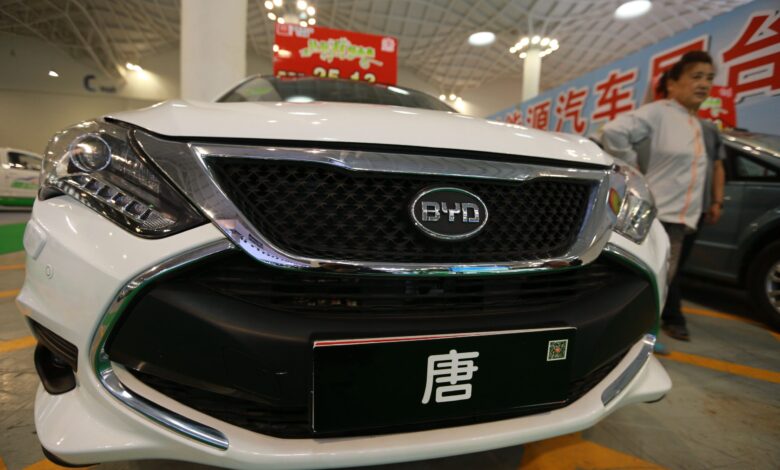Xi and China’s Electric Cars Drive Into Hungary

As China’s President Xi Jinping prepares to visit, Hungary’s far-right government is courting Chinese electric vehicle investment. The policy provides economic benefits — but might endanger European unity.
SZEGED, Hungary — Amid the rolling Great Plains, ground is being cleared for a giant new building: a Chinese-owned electric vehicle factory, courtesy of BYD. The €501 million investment in a 300-hectare industrial park is expected to be completed in 2025.
Although the BYD investment promises to promote green energy and economic growth, important questions remain unanswered. Is this factory a harbinger of progress or a pawn in a larger geopolitical chess game? Is China using Hungary as a Trojan Horse to weaken the EU? The Szeged plant represents the second major Chinese car investment in Hungary and critics fear that it could be the harbinger of an offensive by Victor Orbán, the pro-Putin, pro-Chinese EU leader to undermine EU unity — and torpedo the continent’s all-important car industry
Hungary is important to China. Chinese President Xi Jinping is coming to Budapest this month after visiting France and Serbia. Budapest takes over the rotating presidency of the European Union Council in July.
When Hungarian foreign minister Peter Szijjarto went to Beijing last month, Chinese Foreign Minister Wang Yi urged Budapest to promote a “rational and friendly view” and support a “more pragmatic China policy” by the EU. In response, Szijjarto said Hungary opposed “decoupling” with China and welcomed Chinese investment. Earlier, Szijjarto praised BYD’s decision to build in Szeged, saying “The whole city will receive new momentum, will be thrust into a new dimension.”
For Hungary, the auto industry powers the country’s economic engine. Generous subsidies and tax breaks have attracted powerful German automakers. Audi has built a factory in Győr, Daimler-Benz a Mercedes factory in Kecskemét, and BMW in Debrecen The car industry represented more than a fifth of the country’s 2023 output, employing 884,000 Hungarians. Most of the production is exported, with sales rising from €13.3 billion in 2014 to €25.4 billion in 2023.
Get the Latest
Sign up to receive regular emails and stay informed about CEPA’s work.
Hungary was the first EU leader to sign a contract as part of China’s Belt and Road infrastructure initiative. In 2023, China became the country’s single biggest investor with €10.7 billion. Hungary hosts Huawei’s largest supply center outside China, despite US pressure to ban the tech company.
Electric vehicles are key. China’s CATL is building a €7.3 billion EV battery plant in the southern city of Debrecen. It plans to start production in 2025, supplying batteries to BMW, Mercedes-Benz, Stellantis, and Volkswagen. China watchers say another plant may be announced during Xi’s visit.
It’s not all smooth driving. In Szeged, the future BYD factory is stalled, with an archeological dig blocking construction. During a recent visit, the only evidence of a building was the presence of excavators preparing several long trenches. Environmentalists are protesting the CATL battery plant, concerned that it will cause water pollution. Hungary’s unemployment is low, around 5%, and the government abhors immigrants, so labor shortages loom.
Chinese investments don’t come free, either. For the CATL plant, the Hungarian government is spending almost €2 billion on infrastructure. For BYD in Szeged, the government has pledged €122-125 million on infrastructure and millions more in state aid. Although the details remain confidential, Prime Minister Orbán has stated that they would be for “road networks, public utility networks, and community services.”
Brussels is concerned. The European Commission is investigating whether the aid for the factories in China distorts the EU’s single market. While the investigation is not expected to impact the construction of the factory in Hungary, duties may be imposed on BYD vehicles produced in China. BYD’s European president Michael Shu rejects accusations of illegal subsidies, citing the company’s “unique technology and management efficiency” for its ability to offer low-priced vehicles.
The new Chinese electric vehicle factories in Hungary are more than simple auto investments. They drive China’s electric vehicle offensive into the European heartland — and threaten to give Hungary’s nationalist leader another opportunity and motivation to block a European-wide agreement on how to meet the China challenge.
Greg Pal is an intern for the Transatlantic Defense and Security program at the Center for European Policy Analysis. He is currently a master’s student at Georgetown University in the German and European Studies program.
Peter Roberto is a Program Assistant for the Transatlantic Defense and Security program at the Center for European Policy Analysis.
Bandwidth is CEPA’s online journal dedicated to advancing transatlantic cooperation on tech policy. All opinions are those of the author and do not necessarily represent the position or views of the institutions they represent or the Center for European Policy Analysis.
Read More From Bandwidth
CEPA’s online journal dedicated to advancing transatlantic cooperation on tech policy.



